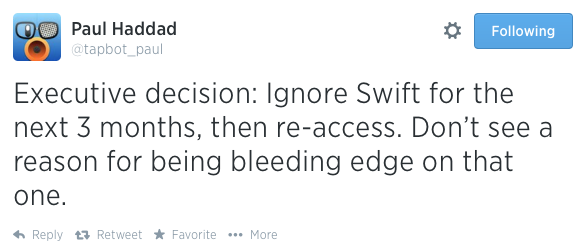Apple’s new development language Swift has made the news across the globe last month. We talked to a number of professional iOS developers to find out what they think about Swift: the vast majority of them welcomed the innovation. A brand new language being accounted for a major platform is a rare thing to say the least. However, is Swift really that game changing right now, when it’s yet to move out of its beta?
Not That Fast!
In many ways Swift is really going to make developers’ life easier – more accessible, simple and flexible. The prototyping gets easier; the syntax gets much more forgiving; class names get more intuitive. Many suppose they will no longer need the complex Objective-C to build iOS apps. However, it’s not all that easy. First of all – it will take managers considerable time to actually start trusting Swift developers with no knowledge of Objective-C development services. And secondly – it’s not even out yet, so we definitely should give it some time.
Read more about app development company.
It’s a bit too early now to make global decisions development-wise. Learning new skills does not imply forgetting the old ones. The whole iOS code is currently in Objective-C, and developers, especially the juniors, will have to get familiar with the code base if they truly want to pursue this career.
What Does Swift Mean for iOS Developer Career?
A number of employees have calmed the Swift hype. Popular iOS developer Paul Haddad (@tapbot_paul) heralded one of the most reasonable attitudes for both employers and employees in a single tweet:

That said, those developers that want to transition careers should not dump Objective C just yet. CocoaPods, AF Networking and other developer tools, libraries and frameworks are all in Objective C – one cannot just shift to another language right away. There are still barriers for entry, but applications will gradually move towards Swift.
Read more about ios app development.
Switching careers will get easier, too, but that will take some time, as more and more apps will be developed in Swift. Junior iOS developers in the foreseeable future will face the need to know both languages. Managers will still check the knowledge of Cocoa and Cocoa Touch, so getting a tougher grip on these fundamental matters as well as adding to them (SQL, Web development, UX, etc.) will much likely be the game changer in terms of developer careers.
Interested in iOS 7 / iOS 7.1 apps development? Please check out Intersog's offering here.
Featured image source: devmonologue.com/ios/






